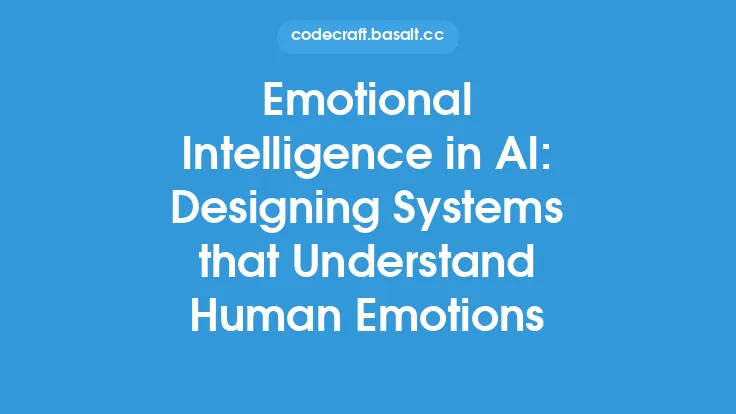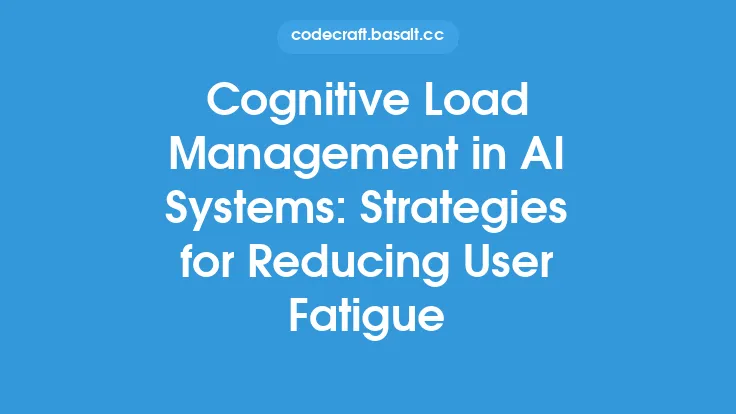The field of artificial intelligence (AI) has experienced tremendous growth in recent years, with AI systems being integrated into various aspects of our daily lives. As AI becomes increasingly ubiquitous, it is essential to consider the psychological aspects of human behavior when interacting with these systems. Understanding the psychology of user experience is crucial for designing AI systems that are intuitive, efficient, and enjoyable to use. This article will delve into the psychological principles that underlie human behavior in AI systems, exploring the cognitive, emotional, and social factors that influence user experience.
Introduction to Human-Computer Interaction
Human-computer interaction (HCI) is a multidisciplinary field that focuses on the design, evaluation, and implementation of interactive computing systems. HCI is concerned with understanding how humans interact with computers and designing systems that are easy to use, efficient, and effective. In the context of AI, HCI plays a critical role in ensuring that AI systems are designed to meet the needs and abilities of their users. By understanding the psychological principles of human behavior, designers and developers can create AI systems that are more intuitive, user-friendly, and effective.
Cognitive Psychology and AI Systems
Cognitive psychology is the study of mental processes such as perception, attention, memory, language, problem-solving, and decision-making. In the context of AI systems, cognitive psychology is essential for understanding how users process information, make decisions, and interact with AI interfaces. For example, the concept of cognitive load refers to the amount of mental effort required to complete a task. AI systems that are designed to minimize cognitive load can improve user experience by reducing the amount of mental effort required to interact with the system. Additionally, understanding how users attend to and process information can help designers create AI systems that are more intuitive and easier to use.
Emotional Intelligence and AI Systems
Emotional intelligence refers to the ability to recognize and understand emotions in oneself and others. In the context of AI systems, emotional intelligence is essential for designing systems that can understand and respond to user emotions. For example, AI systems that are designed to recognize and respond to user frustration or confusion can improve user experience by providing more effective support and guidance. Additionally, AI systems that are designed to evoke positive emotions such as joy or satisfaction can improve user engagement and motivation.
Social Psychology and AI Systems
Social psychology is the study of how people think, feel, and behave in social situations. In the context of AI systems, social psychology is essential for understanding how users interact with AI systems in social contexts. For example, the concept of social presence refers to the degree to which a user feels like they are interacting with a real person or entity. AI systems that are designed to create a sense of social presence can improve user experience by making the interaction feel more natural and engaging. Additionally, understanding how users form attitudes and opinions about AI systems can help designers create systems that are more persuasive and effective.
Human Factors in AI System Design
Human factors refer to the physical, cognitive, and social characteristics of humans that are relevant to the design of AI systems. In the context of AI system design, human factors are essential for ensuring that AI systems are designed to meet the needs and abilities of their users. For example, understanding how users perceive and process visual information can help designers create AI systems with more effective visual interfaces. Additionally, understanding how users interact with AI systems in different contexts and environments can help designers create systems that are more flexible and adaptable.
The Role of Feedback in AI Systems
Feedback is a critical component of AI systems, as it provides users with information about their performance, progress, and outcomes. Feedback can be either intrinsic (e.g., a sense of satisfaction or accomplishment) or extrinsic (e.g., a reward or punishment). In the context of AI systems, feedback is essential for improving user experience by providing users with a sense of control, agency, and motivation. For example, AI systems that provide immediate and informative feedback can help users learn and improve more quickly. Additionally, AI systems that provide feedback that is tailored to the user's needs and abilities can improve user experience by making the interaction feel more personalized and supportive.
The Importance of User Testing and Evaluation
User testing and evaluation are critical components of the AI system design process. By testing and evaluating AI systems with real users, designers and developers can identify usability issues, improve user experience, and ensure that the system meets the needs and abilities of its users. User testing and evaluation can involve a range of methods, including usability testing, user interviews, and surveys. For example, usability testing can help designers identify issues with the AI system's interface or functionality, while user interviews can provide more in-depth information about user needs and preferences.
Conclusion
The psychology of user experience is a critical component of AI system design, as it provides a framework for understanding how users interact with AI systems and how to design systems that are more intuitive, efficient, and enjoyable to use. By understanding the cognitive, emotional, and social factors that influence user behavior, designers and developers can create AI systems that are more effective, persuasive, and engaging. Additionally, by incorporating human factors, feedback, and user testing and evaluation into the design process, designers and developers can ensure that AI systems are designed to meet the needs and abilities of their users. As AI continues to evolve and become increasingly ubiquitous, it is essential to prioritize the psychology of user experience to create AI systems that are more user-friendly, effective, and beneficial to society.





